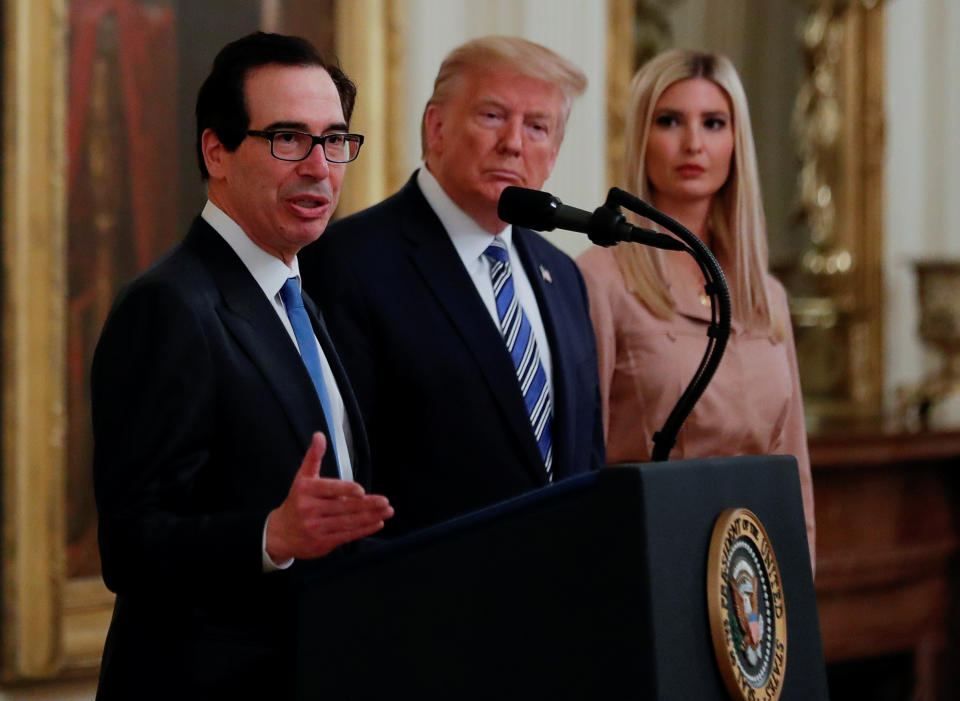This tweak to the PPP could save small businesses $7 billion
The Paycheck Protection Program was designed to be a two-step process. A small business would receive a forgivable loan to keep them afloat during the pandemic. Then later, if they used the money in appropriate ways, they’d have the loan forgiven.
Step 1 has largely worked well. Over 5 million loans have been given out, totaling over half a trillion dollars.
Step 2 has been a little bumpier. Right now, it’s possible for the smallest of loan recipients to spend a significant chunk of their PPP loan simply on the paperwork to navigate the forgiveness process.
Both Democrats and Republicans say that’s wrong and they have a fix. The problem? As stimulus negotiations have faltered, this somewhat simple bureaucratic change has been in limbo.
The idea is to allow small businesses to “have a little bit easier process of getting the loan forgiven and the lending institutions would also be able to have a more streamlined process," said Rep. Chrissy Houlahan (D-PA), in an interview with Yahoo Finance.
Help for ‘businesses just trying to make ends meet’
With overall stimulus negotiations deadlocked perhaps until after the election, advocates of the idea, like Houlahan, are still hoping for a deal but also making a last-ditch effort to pass this fix on its own before Congress adjourns in the coming days.
The short standalone bill – of which Houlahan is a lead sponsor – doesn’t add any more money to the program or allow a second wave of loans (which, in fact, both parties also support). It’s simply designed to streamline the process "for these 5 million small businesses just trying to make ends meet," said Richard Hunt, CEO and president of the Consumer Bankers Association, during a recent interview.

If the change is made, a small business with a loan of less than $150,000 could have their debt forgiven if the recipient fills out a one-page form and attests that the funds were used in accordance with PPP guidelines. The current loan forgiveness form requires a detailed accounting of how the money was spent.
On Thursday, Hunt’s group announced a coalition of more than 100 trade associations representing small businesses and financial institutions to help with the push for the legislation.
Another front in the back and forth on the PPP could come from Rep. Jaime Herrera Beutler (R-WA), who is trying to use a legislative maneuver to force a House vote in the coming days on a stand-alone extension of the PPP until the end of the year.
Looking at ‘the big money’
Advocates note that many of the cases of PPP fraud have come from the bigger loans, and there’s nothing in the legislation that prevents the audit of smaller loans for fraud.
Currently about 86% of the loans from the Paycheck Protection Program are for loans less than $150,000, which represent about 23% of the total money given out.

"It frees up the lending institutions and the people that are watching to be able to look at the big money," Houlahan says.
The legislation is sponsored in the Senate by Sen. Kevin Cramer (R-ND), Bob Menendez (D-NJ), Thom Tillis (R-NC) and Kyrsten Sinema (D-AZ). In the House, Houlahan is leading the effort also with Fred Upton (R-MI).
Hunt, who represents banks across the country holding a combined $14.5 trillion in assets – noted that his sister is a PPP recipient. She has a small soup business in Louisiana with one employee. Hunt said she was told by her accountant it would cost $2,500 in accountant fees to navigate the current loan forgiveness process. “That's just absurd,” he said. “Congress needs to get off its duff and get moving to help small businesses out.”
In a letter to Congressional leaders, the banking coalition estimated that if the bill was passed, “these hard-hit businesses would save more than $7 billion and hours of paperwork.”
Ben Werschkul is a producer for Yahoo Finance in Washington, DC.
Read more:
Justice Department has charged 57 people with trying to steal $175 million in PPP funds
Both Democrats, GOP are now on board for a second wave of PPP loans
Expect 2 'major waves' of unemployment if D.C. gridlock continues, Obama economic advisor says
Read the latest financial and business news from Yahoo Finance
Follow Yahoo Finance on Twitter, Facebook, Instagram, Flipboard, LinkedIn,YouTube, and reddit.
